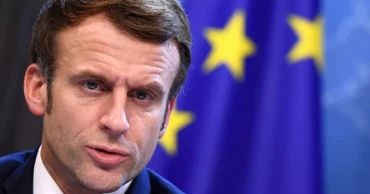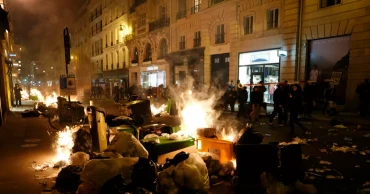Emmanuel Macron
Macron says France will sign agreement with Bangladesh to finance climate-change adaptation, loss and damage in first half of 2024
French President Emmanuel Macron has said his country will sign an agreement with Bangladesh to finance climate-change adaptation and loss and damage in the first half of 2024.
The French Development Agency will be contributing €1 billion ($1.1 billion) in investment, and the IMF will be extending up to $1 billion worth of SDRs in new loans, Macron said.
"This also implies identifying, on a global scale, governance mechanisms for the most crucial challenges we will have to face in the coming years, access to water being one of the most pressing. In this regard, France and Kazakhstan will convene a One Water Summit during the United Nations General Assembly in September 2024," wrote the French president in an article, titled "Pillars of Green Wisdom," published by the Project Syndicate.
For the most vulnerable countries, he said, they must create conditions that enable them to finance their climate-change mitigation and adaptation efforts and access the green technologies that are the new engines of growth.
Russia launches the biggest aerial barrage of the war and kills 30 civilians, Ukraine says
"This implies going further than traditional ‘official development assistance’ and doing for vulnerable countries what rich countries did for themselves during the COVID-19 pandemic: pursue an unorthodox fiscal and monetary policy," wrote President Macron.
"The results are already there: in two years, following the initiative we took in Paris in the spring of 2021, we have released over $100 billion in special drawing rights (SDRs, the International Monetary Fund’s reserve asset) for vulnerable countries," he wrote.
By activating this “dormant asset,” Macron said they are extending 20-year loans at near-zero interest rates to finance climate action and pandemic preparedness in the poorest countries.
"We have begun to change debt rules to suspend payments for such countries, should a climate shock occur. And we have changed the mandate of multilateral development banks, such as the World Bank, so that they take more risks and mobilize more private money," he said.
Macron said they are going to continue working on this, including within the framework of the new loss and damage fund, where they must mobilize new private insurance mechanisms in the face of climate risk. "We will start from the specific needs of the hardest-hit countries."
The French president said they will not succeed if they cannot reform the World Bank and the IMF, which play a prominent role in establishing the norms and financing the green transition on a global scale.
Jaishankar meets Putin and Lavrov in Moscow, praises growing trade
Eighty years after their creation, these institutions remain underfunded, relative to the size of the global economy and population, and emerging and developing countries continue to be shut out of their governance, he said.
"But we will not be able to agree on goals and financing until every country negotiating is on an equal footing.To this end, we must review Bretton Woods governance, and ask emerging countries to assume their share of accountability in financing global public goods," said Macron.
He said, “We must not allow the ongoing war in Ukraine and the fighting in Gaza to distract us from collective efforts to reduce our greenhouse-gas emissions, achieve carbon neutrality by 2050, save our biodiversity, and fight poverty and inequality.”
The world’s most advanced economies, which have also been the main CO2 emitters since the industrial revolution, must move away from fossil fuels, he noted.
He also wrote, “Science has set the trajectory: we must move away from coal by 2030, from oil by 2045, and from gas by 2050. While the G7 countries bear the greatest responsibility, China, which is now the second-largest emitter in history, must be fully committed, too.”
“While it is the G7’s responsibility to move away from coal by 2030 (France will have done so in 2027), emerging economies are now the biggest coal consumers. In these countries, we need to speed up the financing of renewables, as well as nuclear power, which, as a manageable and a decarbonized energy source, must play a key role,” he wrote.
Ukraine celebrates Christmas on Dec. 25 for the first time, distancing itself from Russia
“We must also put private financing and trade at the service of the Paris agreement. The cost of investment must be higher for players in the fossil-fuel sector. We need a green interest rate and a brown interest rate. Similarly, we need a climate clause in our trade agreements, because we cannot simultaneously demand that our industries become greener while supporting the liberalization of international trade in polluting products.
“Moreover, we must focus on building the basis of a ‘bio-economy’ that will pay for the services provided by nature. Nature is our best technology to sequester carbon on a large scale. The countries with the most important carbon and biodiversity reserves, especially in the three main tropical forest basins, must obtain much greater resources, determined on a country-by-country basis, in exchange for their stewardship of these vital reserves. France has already launched three contracts of this type at COP28, with Papua New Guinea, the Republic of the Congo, and the Democratic Republic of the Congo,” Macron wrote.
“But reform of the voluntary carbon market is essential. We need to create an international carbon and biodiversity exchange that will allow governmental and private actors to organize voluntary carbon credit swaps, based on sufficiently ambitious criteria to avoid greenwashing, and to remunerate local communities.
“The ocean is our most important carbon sink, and we must protect it. France and Costa Rica will convene the third United Nations Ocean Conference in Nice in June 2025, with the aim of updating international law, including on the prohibition of plastic pollution and on protection of the deep sea and seabed. These reforms would also enable the development of national strategies for seaboard protection by countries with exclusive economic zones,” the French president wrote.
‘A lie’: French ambassador dismisses claim of journalists’ visa requests being denied.
2 years ago
Being a US ally doesn’t mean being a ‘vassal’: Macron on Taiwan issue
French President Emmanuel Macron has defended his recent remarks regarding Taiwan, in which he stated that France should not become involved in an escalation between the United States and China.
He made the remarks during a weekend interview following his three-day state visit to China, reports BBC.
Being a US ally did not mean being a “vassal”, he also said.
Politicians and other public figures on both sides of the Atlantic have criticized his statements.However, on a visit to the Netherlands on Wednesday, he stated that he stood by his views, said the report.
Read More: China military displays force toward Taiwan after Tsai trip
“Being an ally does not mean being a vassal... doesn’t mean that we don’t have the right to think for ourselves,” Macron told a press conference in the Netherlands.
Macron also stated that France’s support for the “status quo” in Taiwan had not altered and that Paris “supports the One China policy and the search for a peaceful resolution to the situation.”
Meanwhile, the White House has downplayed the statements, saying the Biden administration is “comfortable and confident in the terrific bilateral relationship we have with France.”
Taiwan’s foreign ministry took a similar approach but stated that it “noted” Macron’s remarks.A top Taiwanese official, on the other hand, was “puzzled” by the comments.
Read More: China's military announces 'combat readiness patrols' around Taiwan
“Are ‘liberté, égalité, fraternité’ out of fashion?” – wrote Taiwan’s parliament speaker You Si-kun on social media, referring to France’s motto.
According to some analysts, Macron’s remarks signal that the US is equally to blame for the escalating tensions over Taiwan, making it more difficult for the EU to take a tougher stance with Beijing.
Meanwhile, China has appreciated Macron’s statements and stated that it is not surprised by the criticism, added the report.
“Some countries do not want to see other nations become independent and self-reliant, and instead always want to coerce other countries into obeying their will,” China’s foreign ministry spokesperson Wang Wenbin said.
Read More: Australia won’t promise to side with US in Taiwan conflict
Taiwan, with its own constitution and democratically chosen leaders, sees itself as different from the Chinese mainland.
However, Beijing regards Taiwan as a breakaway province that will inevitably fall under Chinese rule and has never renounced the use of force to achieve this.
While the United States diplomatically recognizes China’s view that there is only one Chinese government, President Joe Biden has pledged to engage militarily to support Taiwan if it is attacked, the report said.
Beijing began practising the encirclement of Taiwan earlier this week during days of military manoeuvres regarded as retaliation to the recent meeting between Taiwan’s President Tsai Ing-wen and US House Speaker Kevin McCarthy.
Read More: Anger spreads in France over Macron's retirement bill push
President Tsai said on Saturday that her administration will continue to collaborate with the US and other democracies while the island faces “continued authoritarian expansionism” from China.
2 years ago
Anger spreads in France over Macron's retirement bill push
Protesters disrupted traffic in Paris on Friday as angry critics, political opponents and labor unions around France blasted President Emmanuel Macron's decision to force a bill raising the retirement age from 62 to 64 through parliament without a vote.
Opposition parties were expected to start procedures later Friday for a no-confidence vote on the government led by Prime Minister Elisabeth Borne. The vote would likely take place early next week.
Macron ordered Borne on Thursday to wield a special constitutional power to push the highly unpopular pension bill through without a vote in the National Assembly, France's lower house of parliament.
Also Read: France’s Macron risks his government to raise retirement age
His calculated risk infuriated opposition lawmakers, many citizens and unions. Thousands gathered in protest Thursday at the Place de la Concorde, which faces the National Assembly building. As night fell, police officers charged the demonstrators in waves to clear the Place. Small groups then moved through nearby streets in the chic Champs-Elysees. neighborhood setting street fires.
Similar scenes repeated themselves in numerous other cities, from Rennes and Nantes in eastern France to Lyon and the southern port city of Marseille, where shop windows and bank fronts were smashed, according to French media.
French Interior Minister Gérald Darmanin told radio station RTL on Friday that 310 people were arrested overnight. Most of the arrests, 258, were made in Paris, according to Darmanin.
The trade unions that had organized strikes and marches against a higher retirement age said more rallies and protest marches would take place in the days ahead. “This retirement reform is brutal, unjust, unjustified for the world of workers,” they declared.
Macron has made the proposed pension changes the key priority of his second term, arguing that reform is needed to keep the pension system from diving into deficit as France, like many richer nations, faces lower birth rates and longer life expectancy.
Macron decided to invoke the special power during a Cabinet meeting a few minutes before a scheduled vote in the National Assembly, where the legislation had no guarantee of securing majority support. The Senate adopted the bill earlier Thursday.
Opposition lawmakers demanded the government to step down. If the expected no-confidence motion passes, which requires approval from more than half of the Assembly, it would be a first since 1962 and force the government to resign.
Macron could reappoint Borne if he chooses, and a new Cabinet would be named. If the motion does not succeed, the pension bill would be considered adopted.
2 years ago
France’s Macron risks his government to raise retirement age
French President Emmanuel Macron ordered his prime minister to wield a special constitutional power Thursday that skirts parliament to force through a highly unpopular bill raising the retirement age from 62 to 64 without a vote.
His calculated risk set off a clamor among lawmakers, who began singing the national anthem even before Prime Minister Elisabeth Borne arrived in the lower chamber. She spoke forcefully over their shouts, acknowledging that Macron's unilateral move will trigger quick motions of no-confidence in his government.
The fury of opposition lawmakers echoed the anger of citizens and workers' unions. Thousands gathered at the Place de la Concorde facing the National Assembly, lighting a bonfire. As night fell, police charged the demonstrators in waves to clear the elegant Place. Small groups of those chased away moved through nearby streets in the chic neighborhood setting street fires. At least 120 were detained, police said.
Similar scenes repeated themselves in numerous other cities, from Rennes and Nantes in the east to Lyon and the southern port city of Marseille, where shop windows and bank fronts were smashed, according to French media. Radical leftist groups were blamed for at least some of the destruction.
Also Read: France’s development agency signs deal with Bangladesh to support energy efficiency scheme
The unions that have organized strikes and marches since January, leaving Paris reeking in piles of garbage, announced new rallies and protest marches in the days ahead. “This retirement reform is brutal, unjust, unjustified for the world of workers,” they declared.
Macron has made the proposed pension changes the key priority of his second term, arguing that reform is needed to keep the pension system from diving into deficit as France, like many richer nations, faces lower birth rates and longer life expectancy.
Macron decided to invoke the special power during a Cabinet meeting at the Elysee presidential palace, just a few minutes before the scheduled vote in France’s lower house of parliament, because he had no guarantee of a majority.
“Today, uncertainty looms" about whether a majority would have voted for the bill, Borne acknowledged, but she said “We cannot gamble on the future of our pensions. That reform is necessary.”
Borne prompted boos from the opposition when she said her government is accountable to the parliament. Lawmakers can try to revoke the changes through no-confidence motions, she said.
“There will actually be a proper vote and therefore the parliamentary democracy will have the last say,” Borne said.
She said in an interview Thursday night on the TV station TF1 that she was not angry when addressing disrespectful lawmakers but “very shocked.”
“Certain (opposition lawmakers) want chaos, at the Assembly and in the streets,” she said.
Opposition lawmakers demanded the government step down. One Communist lawmaker called the presidential power a political “guillotine.” Others called it a “denial of democracy” that signals Macron’s lack of legitimacy.
Marine Le Pen said her far-right National Rally party would file a no-confidence motion, and Communist lawmaker Fabien Roussel said such a motion is “ready” on the left.
“The mobilization will continue,” Roussel said. “This reform must be suspended.”
The leader of The Republicans, Eric Ciotti, said his party won’t “add chaos to chaos” by supporting a no-confidence motion, but some of his fellow conservatives at odds with the party’s leadership could vote individually.
A no-confidence motion, expected early next week, needs approval by more than half the Assembly. If it passes — which would be a first since 1962 — the government would have to resign. Macron could reappoint Borne if he chooses, and a new Cabinet would be named.
If no-confidence motions don't succeed, the pension bill would be considered adopted.
The Senate adopted the bill earlier Thursday in a 193-114 vote, a tally largely expected since the conservative majority of the upper house favored the changes.
Raising the retirement age will make workers put more money into the system, which the government says is on course to run a deficit. Macron has promoted the pension changes as central to his vision for making the French economy more competitive. The reform also would require 43 years of work to earn a full pension.
Leftist leader Jean-Luc Melenchon told the crowd at the Concorde that Macron has gone “over the heads of the will of the people.” Members of Melenchon’s France Unbowed party were foremost among the lawmakers singing the Marseillese in an attempt to thwart the prime minister.
Economic challenges have prompted widespread unrest across Western Europe, where many countries, like France, have had low birthrates, leaving fewer young workers to sustain pensions for retirees. Spain’s leftist government joined with labor unions Wednesday to announce a “historic” deal to save its pension system.
Spain's Social Security Minister José Luis Escrivá said the French have a very different, unsustainable model and “has not addressed its pension system for decades." Spain's workers already must stay on the job until at least 65 and won’t be asked to work longer — instead, their new deal increases employer contributions for higher-wage earners.
2 years ago
France to make condoms free for anyone under 25, Macron says
France will make condoms free in pharmacies for anyone up to age 25 in the new year, President Emmanuel Macron announced Friday.
The move comes as the government says sexually transmitted diseases are on the rise among young people, and as this year’s exceptional inflation is cutting especially deeply into the budgets of France’s poorest.
Girls and women 25 and under already can get free birth control in France as part of government efforts to ensure that young people of all incomes can prevent unwanted pregnancy. Existing measures don’t apply to men, however, or specifically address access for transgender or nonbinary people.
Macron had said Thursday that condoms would be free in pharmacies for anyone 18-25 starting Jan. 1. But after a French TV presenter and others challenged him on social networks Friday over why the condom measure did not include minors, the president agreed to expand the program.
Read more: Biden, Macron vow unity against Russia, discuss trade row
“Let's do it,” Macron said in a selfie video that he shot from the sidelines of a summit in Spain. He later tweeted: “A lot of minors also have sex ... they need to protect themselves too.”
Macron, who was France's youngest-ever president when he was first elected in 2017 at age 39, also promised stepped-up efforts to prevent and test for HIV and other sexually transmitted viruses.
France’s state health care system covers some birth control costs but not all, and doctor appointments for low-income patients often require long waits. Abortions in France are available free for everyone.
Several other European countries offer free or subsidized contraception.
3 years ago
Biden, Macron vow unity against Russia, discuss trade row
Presidents Joe Biden and Emmanuel Macron vowed to maintain a united front against Russia on Thursday amid growing worries about waning support for Ukraine’s war effort in the U.S. and Europe. Biden also signaled he might be willing to tweak aspects of his signature climate legislation that have raised concerns with France and other European allies.
Biden honored Macron with a grand state dinner Thursday evening — the first of the U.S. president’s COVID-19 shadowed presidency for a foreign leader. But following up on Biden’s upbeat comments might not go as smoothly as that fancy affair. Republicans who are about to take control of the House have shown less willingness than Biden to spend billions on Ukraine, and Democratic lawmakers said Thursday they were not about to jump back into the climate legislation.
In fact, for all the positive statements, Macron’s visit to Washington has been tempered by his criticism of Biden’s Inflation Reduction Act and the challenges both leaders face amid the mounting costs of keeping military and economic aid flowing to Kyiv with no end in sight for the Russian invasion.
Despite the differences, Biden and Macron sought to underscore that the U.S.-France alliance remains solid and that the West must hold steadfast against Russian President Vladimir Putin’s war in Ukraine.
Read more: Biden, Macron ready to talk Ukraine, trade in state visit
“Today, we reaffirm that, as I said, we’re going to stand together against this brutality,” Biden said. “Putin thinks that he can crush the will of all those who oppose his imperial ambitions by attacking civilian infrastructure in Ukraine, choking off energy to Europe to drive up prices, exacerbating the food crisis. That’s hurting very vulnerable people not just in Ukraine but around the world and he’s not going to succeed.”
Both leaders at an outdoor welcoming ceremony paid tribute to their countries’ long alliance. But they acknowledged difficult moments lay ahead as Western unity shows some wear nine months into the war in Ukraine.
In Washington, Republicans are set to take control of the House, where GOP leader Kevin McCarthy has said his party’s lawmakers will not write a “blank check” for Ukraine. Across the Atlantic, Macron’s efforts to keep Europe united will be tested by the mounting costs of supporting Ukraine in the war and as Europe battles rising energy prices that threaten to derail the post-pandemic economic recovery.
Macron stressed that the issue has ramifications far beyond Ukraine’s borders.
“What is at stake in Ukraine is not just very far from here, in a small country somewhere in Europe,” he declared. “But it’s about our values. And about our principles.”
“Our two nations are sisters in the fight for freedom,” he said.
Biden indicated he would be willing to talk with Putin if the Russian leader demonstrated that he seriously wanted to end the invasion. But the U.S. president, as always, conditioned such talks on support by NATO allies.
“I’m prepared to speak with Mr. Putin if in fact there is an interest in him deciding that he’s looking for a way to end the war,” Biden said. “He hasn’t done that yet.”
In addition to their talk of Ukraine — what White House officials said was at the top of the agenda — the two leaders discussed Macron’s and other leaders’ concerns about the recently enacted clean energy law.
Macron has made clear that he and other European leaders are opposed to incentives in the Inflation Reduction Act that favor American-made climate technology, including electric vehicles.
Biden acknowledged “glitches” in the legislation but said “there’s tweaks we can make” to satisfy allies.
“The United States makes no apology. And I make no apologies since I wrote it for the legislation we’re talking about,” Biden added.
However, Macron said that while the Biden administration’s efforts to curb climate change should be applauded, the subsidies would be an enormous setback for European companies.
“We want to succeed together, not one against the other,” Macron added. He said the U.S. and France would “resynchronize” their clean energy efforts to ensure there’s no “domino effect” that undermines clean energy projects in Europe.
On Capitol Hill, despite Biden’s talk of possible changes in the law, Senate Finance Committee Chairman Ron Wyden, one of the bill’s main architects, said, “Congress passed a law to rev up the American electric automobile industry, create good-paying American jobs and tackle climate change at the same time. I have no intention of reopening it.”
Read more: Biden strengthening US policy to stem sexual violence in war zones, including in Ukraine
The European Union has also expressed concern that tax credits in the law would discriminate against European producers and break World Trade Organization rules.
The leaders, with aides, met for about three hours after taking part in a formal ceremony with hundreds of people gathered on the South Lawn on a sunny, chilly morning. There was a 21-gun salute and review of troops, and ushers distributed small French and American flags to the guests.
Both Biden and Macron in their public comments sought to keep the focus on the situation in Ukraine.
The state visit should provide a boost to Macron diplomatically that he can leverage back in Europe. His outspoken comments help him demonstrate that he’s defending French workers, even as he maintains a close relationship with Biden. The moment also helps Macron burnish his image as the European Union’s most visible and vocal leader, at a time when Europe is increasingly concerned that its economy will be indelibly weakened by the Ukraine war and resulting energy and inflation crises.
To that end, Biden praised Macron as “not just the leader of France” and for being “very outspoken and very, very commanding in Europe.” In his public comments, Macron repeatedly referred to the U.S. president as “dear Joe.”
Still, at moments, Macron’s rhetoric has rankled U.S. and Ukrainian officials, with calls for Ukraine and Russia to meet at the negotiating table. White House officials have publicly maintained that it is solely up to Ukraine’s leadership to decide when it’s appropriate to engage the Russians and have stressed the war could end immediately if Putin ended his invasion.
Macron also raised eyebrows earlier this month in a speech at a summit in Bangkok when he referred to the U.S. and China as “two big elephants” that are on the cusp of creating “a big problem for the rest of the jungle.” His visit to Washington came as both the U.S. and France are keeping their eyes on China after protests have broken out in several mainland cities and Hong Kong over Beijing’s “zero COVID” strategy.
The state visit marked a return of a White House tradition of honoring close foreign allies that dates back to Ulysses S. Grant’s presidency.
Macron and his wife, Brigitte, came to the U.S. bearing gifts carefully tailored to their American hosts, including a vinyl record and CD of the original soundtrack from the 1966 film “Un Homme et une Femme,” which the Bidens went to see on their first date, according to the palace.
Among the gifts Biden and first lady Jill Biden presented the Macrons was a mirror framed by fallen wood from the White House grounds and made by an American furniture maker.
Vice President Kamala Harris hosted Macron for a lunch at the State Department before the evening state dinner in an enormous tented pavilion constructed on the White House South Lawn. The dinner for hundreds attracted big names from fashion, entertainment, business and politics.
3 years ago
PM greets French President Macron on re-election
Prime Minister Sheikh Hasina on Tuesday greeted Emmanuel Macron on his re-election as the President of France.
“It is indeed an immense pleasure to convey my warmest congratulations on your victory in the recently held Presidential Elections,” she said in her congratulatory message.
Also read: To Europe’s relief, France’s Macron wins but far-right gains
She mentioned that the re-election manifests the trust and confidence of the great French people ... reposed in him and his initiatives and commitments to ensure their welfare and prosperity.
“The election, as you said, was a referendum for the European Union, secularism, and fraternity," she said.
She firmly believed that the French people have given Macron the mandate to carry on with his values and vision.
“I trust, under your able stewardship, France will continue to serve as an essential player on the global stage beyond its role within the European Union.”
She recalled the celebration of 50 years of diplomatic relations between the two countries, and expressed commitments to deepen and strengthen cooperation in diverse areas of shared interest.
“We count on France being on our side in our efforts to enbance trade, connectivity, and security cooperation with the European Union.”
She looked forward to working closely with Macron in advancing shared priorities of combating climate change, preventing violent extremism, promoting regular migration, and ensuring gender equality.
She again fondly recalled her visit to France in November last year and expressed deep gratitude for extending the gracious hospitality to her and her delegation.
Also read: In France, it's Macron vs. Le Pen, again, for presidency
She renewed her invitation to Macron to visit Bangladesh at his early convenience.
“I take this opportunity to recall your promise to visit Bangladesh if re-elected.”
She mentioned that Bangladesh’s President and she look forward to receiving him and his lady wife in Dhaka at his earliest convenience.
3 years ago
Modi congratulates Prez Macron on his re-election
Indian Prime Minister Narendra Modi on Monday congratulated "friend" Emmanuel Macron on his re-election as the French President for another five-year term.
Calling Macron his "friend", the Indian PM took to Twitter to say that he looks forward to working with the French leader to bolster the strategic ties between Delhi and Paris.
Also read:To Europe’s relief, France’s Macron wins but far-right gains
"Congratulations to my friend @EmmanuelMacron on being re-elected as the President of France! I look forward to continue working together to deepen the India-France Strategic Partnership," Modi wrote.
Modi is likely to embark on a five-day tour of Europe next week. During his proposed visit from May 2 to 6, he is likely to hold bilateral meetings with the French President and German Chancellor Olaf Scholz.
Also read:In France, it's Macron vs. Le Pen, again, for presidency
Defeating his far-right rival Marine Le Pen by 58.55% to 41.45%, 44-year-old Macron on Sunday became the first sitting president in France to get re-elected in 20 years.
3 years ago
To Europe’s relief, France’s Macron wins but far-right gains
French President Emmanuel Macron comfortably won a second term Sunday, triggering relief among allies that the nuclear-armed power won’t abruptly shift course in the midst of the war in Ukraine from European Union and NATO efforts to punish and contain Russia’s military expansionism.
The second five-year term for the 44-year-old centrist spared France and Europe from the seismic upheaval of having firebrand populist Marine Le Pen at the helm, Macron’s presidential runoff challenger who quickly conceded defeat but still scored her best-ever electoral showing.
Acknowledging that “numerous” voters cast ballots for him simply to keep out the fiercely nationalist far-right Le Pen, Macron pledged to reunite the country that is “filled with so many doubts, so many divisions” and work to assuage the anger of French voters that fed Le Pen’s campaign.
“No one will be left by the side of the road,” Macron said in a victory speech against the backdrop of the Eiffel Tower and a projection of the blue-white-and-red tricolor French flag. He was cheered by several hundred supporters who happily waved French and EU flags.
“We have a lot to do and the war in Ukraine reminds us that we are going through tragic times where France must make its voice heard,” Macron said.
During her campaign, Le Pen pledged to dilute French ties with the 27-nation EU, NATO and Germany, moves that would have shaken Europe’s security architecture as the continent deals with its worst conflict since World War II. Le Pen also spoke against EU sanctions on Russian energy supplies and faced scrutiny during the campaign over her previous friendliness with the Kremlin.
A chorus of European leaders hailed Macron’s victory, since France has played a leading role in international efforts to punish Russia with sanctions and is supplying weapons to Ukraine.
“Democracy wins, Europe wins,” said Spanish Prime Minister Pedro Sánchez.
“Together we will make France and Europe advance,” tweeted European Commission President Ursula von der Leyen.
Also Read: In France, it's Macron vs. Le Pen, again, for presidency
Italian Premier Mario Draghi called Macron’s victory “splendid news for all of Europe” and a boost to the EU “being a protagonist in the greatest challenges of our times, starting with the war in Ukraine.”
Macron won with 58.5% of the vote to Le Pen’s 41.5% — significantly closer than when they first faced off in 2017.
Macron is the first French president in 20 years to win reelection, since incumbent Jacques Chirac trounced Le Pen’s father in 2002.
Le Pen called her result “a shining victory,” saying that “in this defeat, I can’t help but feel a form of hope.”
Breaking through the threshold of 40% of the vote is unprecedented for the French far-right. Le Pen was beaten 66% to 34% by Macron in 2017 and her father got less than 20% against Chirac.
She and hard-left leader Jean-Luc Melenchon, one of 10 candidates eliminated in the first round on April 10, both quickly pitched forward Sunday night to France’s legislative election in June, urging voters to give them a parliamentary majority to hamstring Macron.
Le Pen’s score this time rewarded her years-long efforts to make her far-right politics more palatable to voters. Campaigning hard on cost-of-living issues, she made deep inroads among blue-collar voters in disaffected rural communities and in former industrial centers.
Le Pen voter Jean-Marie Cornic, 78, said he cast his ballot for her because he wanted a president who would prioritize “our daily lives — salaries, taxes, pensions.”
The drop in support for Macron compared to five years ago points to a tough battle ahead for the president to rally people behind him in his second term. Many French voters found the 2022 presidential rematch less compelling than in 2017, when Macron was an unknown factor.
Also Read: Macron keeps an open line to Putin as war in Ukraine rages
Leftist voters — unable to identify with either the centrist president or Le Pen — agonized with Sunday’s choice. Some trooped reluctantly to polling stations solely to stop Le Pen, casting joyless votes for Macron.
“It was the least worst choice,” said Stephanie David, a transport logistics worker who backed a communist candidate in round one.
It was an impossible choice for retiree Jean-Pierre Roux. Having also voted communist in round one, he dropped an empty envelope into the ballot box on Sunday, repelled both by Le Pen’s politics and what he saw as Macron’s arrogance.
“I am not against his ideas but I cannot stand the person,” Roux said.
In contrast, Marian Arbre, voting in Paris, cast his ballot for Macron “to avoid a government that finds itself with fascists, racists.”
“There’s a real risk,” the 29-year-old fretted.
Macron went into the vote as the firm favorite but faced a fractured, anxious and tired electorate. The war in Ukraine and the COVID-19 pandemic battered Macron’s first term, as did months of violent protests against his economic policies.
In celebrating victory, Macron acknowledged a debt to voters who helped get him over the line, “not to support the ideas I hold, but to block those of the extreme right.”
“I want to thank them and tell them that I am aware that their vote obliges me for the years to come,” he said. “I am the custodian of their sense of duty, of their attachment to the Republic.”
3 years ago
In France, it's Macron vs. Le Pen, again, for presidency
Incumbent Emmanuel Macron will face far-right nationalist Marine Le Pen in a winner-takes-all runoff for the French presidency, after they both advanced Sunday in the first round of voting in the country’s election to set up another head-to-head clash of their sharply opposing visions for France.
But while Macron won t heir last contest in 2017 by a landslide to become France's youngest-ever president, the same outcome this time is far from guaranteed. Macron, now 44, emerged ahead from Sunday's first round, but the runoff is essentially a new election and the next two weeks of campaigning to the April 24 second-round vote promise to be bruising and confrontational against his 53-year-old political nemesis.
Savvier and more polished as she makes her third attempt to become France's first woman president, Le Pen was handsomely rewarded Sunday at the ballot box for her years-long effort to rebrand herself as more pragmatic and less extreme. Macron has accused Le Pen of pushing an extremist manifesto of racist, ruinous policies. Le Pen wants to roll back some rights for Muslims, banning them from wearing headscarves in public, and to drastically reduce immigration from outside Europe.
Also read: France pushing for energy sanctions against Russia
On Sunday, she racked up her best-ever first-round tally of votes. With most votes counted, Macron had just over 27% and Le Pen had just under 24%. Hard-left leader Jean-Luc Melenchon was third, missing out on the two-candidate runoff, with close to 22%.
Macron also improved on his first-round showing in 2017, despite his presidency being rocked by an almost unrelenting series of both domestic and international crises. They include Russia's war in Ukraine that overshadowed the election and diverted his focus from the campaign.
With polling suggesting that the runoff against Le Pen could be close, Macron immediately started throwing his energies into the battle.
Addressing supporters Sunday night who chanted “five more years,” Macron warned that “nothing is done” and said the runoff campaign will be “decisive for our country and for Europe.”
Claiming that Le Pen would align France with “populists and xenophobes,” he said: “That's not us.”
“I want to reach out to all those who want to work for France," he said. He vowed to “implement the project of progress, of French and European openness and independence we have advocated for.”
The election outcome will have wide international influence as Europe struggles to contain the havoc wreaked by Russian President Vladimir Putin’s invasion of Ukraine. Macron has strongly backed European Union sanctions on Russia while Le Pen has worried about their impact on French living standards. Macron also is a firm supporter of NATO and of close collaboration among the European Union’s 27 members.
Macron for months had looked like a shoo-in to become France’s first president in 20 years to win a second term. But National Rally leader Le Pen, in a late surge, tapped into the foremost issue on many French voters’ minds: soaring costs for food, gas and heating due to rising inflation and the repercussions of Western sanctions on Russia.
To win in round two, both Macron and Le Pen now need to reach out to voters who backed the 10 presidential candidates defeated Sunday.
For some of the losers' disappointed supporters, the runoff vote promises to be agonizing. Melenchon voter Jennings Tangly, a 21-year-old student of English at Paris' Sorbonne University, said the second-round match-up was an awful prospect for her, a choice “between the plague and cholera.”
She described Macron's presidency as “abject,” but said she would vote for him in round two simply to keep Le Pen from the presidential Elysee Palace.
“It would be a survival vote rather than a vote with my heart,” she said.
Le Pen's supporters celebrated with champagne and chanted “We’re going to win!” She sought to reach out to left-wing supporters for round two by promising fixes for “a France torn apart.”
She said the second round presents voters with “a fundamental choice between two opposing visions of the future: Either the division, injustice and disorder imposed by Emmanuel Macron to the benefit of the few, or the uniting of French people around social justice and protection.”
Also read: Macron keeps an open line to Putin as war in Ukraine rages
Some of her defeated rivals were so alarmed by the possibility of Le Pen beating Macron that they urged their supporters Sunday to shift their second-round votes to the incumbent. Melenchon, addressing supporters who sometimes shed tears, repeatedly said: “We must not give one vote to Mrs. Le Pen.”
Describing herself as “profoundly worried,” defeated conservative candidate Valerie Pecresse warned of “the chaos that would ensue” if Le Pen was elected, saying the far-right leader has never been so close to power. Pecresse said she would vote for Macron in the runoff.
To beat Le Pen, Macron will aim to pick apart her attempted rebranding as a less dangerous political force, a makeover that has even highlighted her love of cats.
Her softer image has won over some voters but made others even more suspicious.
Yves Maillot, a retired engineer, said he voted for Macron only to counterbalance Le Pen. He said he fears that her long-standing hostility to the EU could see her try to take France out of the bloc, even though she has dropped that from her manifesto.
“I don't think she's changed at all,” he said. “It's the same thing, but with cats."
3 years ago
















